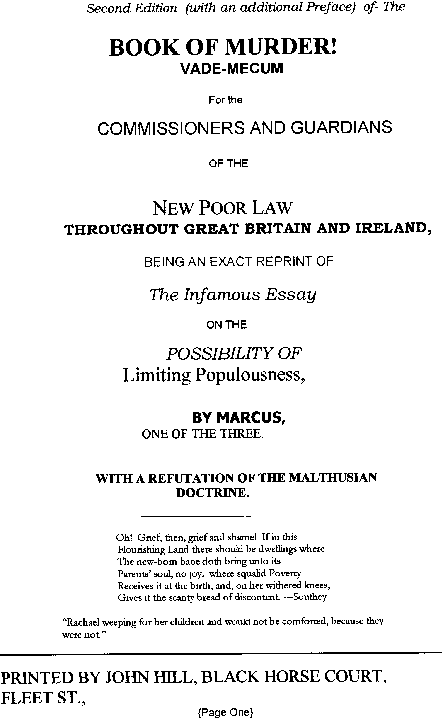
Book of Murder
Encyclopedia

English Poor Laws
The English Poor Laws were a system of poor relief which existed in England and Wales that developed out of late-medieval and Tudor-era laws before being codified in 1587–98...
propaganda presented as the work of one pseudonym
Pseudonym
A pseudonym is a name that a person assumes for a particular purpose and that differs from his or her original orthonym...
ous "Marcus", originally published in Britain during the 1830s by Joshua Hobson
Joshua Hobson
Joshua Hobson was a British Chartist and socialist who was the first publisher of the Book of Murder, a pamphlet attacking the 1834 Poor Law Amendment Act...
. It aimed to incite opposition to the Poor Law Amendment Act 1834
Poor Law Amendment Act 1834
The Poor Law Amendment Act 1834, sometimes abbreviated to PLAA, was an Act of the Parliament of the United Kingdom passed by the Whig government of Lord Melbourne that reformed the country's poverty relief system . It was an Amendment Act that completely replaced earlier legislation based on the...
, claiming that Poor Law commissioners were intent on using infanticide
Infanticide
Infanticide or infant homicide is the killing of a human infant. Neonaticide, a killing within 24 hours of a baby's birth, is most commonly done by the mother.In many past societies, certain forms of infanticide were considered permissible...
to control the explosion in the population of the poor, which had been a fear of the working class
Working class
Working class is a term used in the social sciences and in ordinary conversation to describe those employed in lower tier jobs , often extending to those in unemployment or otherwise possessing below-average incomes...
since the adoption of the 1834 legislation.
The Poor Law Amendment Act 1834 was an Act of Parliament which altered the nature of poor relief in England and Wales – workhouse
Workhouse
In England and Wales a workhouse, colloquially known as a spike, was a place where those unable to support themselves were offered accommodation and employment...
s were built for paupers to receive indoor relief. The anti-Poor Law campaign alleged these pamphlets were the work of Poor Law Commissioners who were known to hold views on population similar to Thomas Malthus
Thomas Malthus
The Reverend Thomas Robert Malthus FRS was an English scholar, influential in political economy and demography. Malthus popularized the economic theory of rent....
, the anti-Poor Law movement also alleged that copies of the original pamphlet had been suppressed.http://dspace.dial.pipex.com/town/terrace/adw03/peel/poorlaw/attacks.htm
One of the first to use the Marcus pamphlet to popularize the idea of a conspiracy against the poor in Radical and Chartist
Chartism
Chartism was a movement for political and social reform in the United Kingdom during the mid-19th century, between 1838 and 1859. It takes its name from the People's Charter of 1838. Chartism was possibly the first mass working class labour movement in the world...
circles was the Reverend Joseph Rayner Stephens, a proponent of violent resistance to the government who made numerous references to the alleged conspiracy while traveling across the country during the period between his December 1838 arrest and 1839 imprisonment.
The book came from two pamphlets by "Marcus" – An Essay of Populousness and On the Possibility of Limiting Populousness, which discussed possible infanticide used to tackle a population explosion and killing by gas. As these pamphlets were published under the name Marcus, the publication of this book is sometimes also referred to as The Marcus Affair.
The books were published by the Chartist
Chartism
Chartism was a movement for political and social reform in the United Kingdom during the mid-19th century, between 1838 and 1859. It takes its name from the People's Charter of 1838. Chartism was possibly the first mass working class labour movement in the world...
leader Feargus O'Connor
Feargus O'Connor
Feargus Edward O'Connor was an Irish Chartist leader and advocate of the Land Plan.- Background :Feargus O'Connor was born into a prominent Irish Protestant family, the son of Irish Nationalist politician Roger O'Connor...
in the Northern Star
Northern Star (chartist newspaper)
The Northern Star and Leeds General Advertiser was a chartist newspaper published in the United Kingdom between 1837 and 1852.-Foundation:Feargus O'Connor, a former Irish MP forging a career in English radical politics, decided to establish a weekly newspaper in 1837...
.

